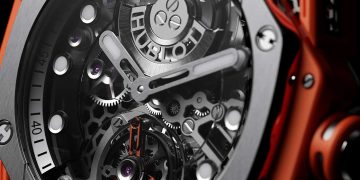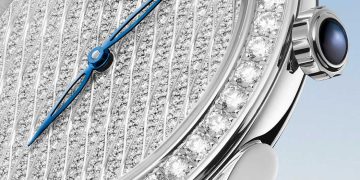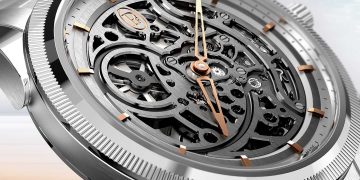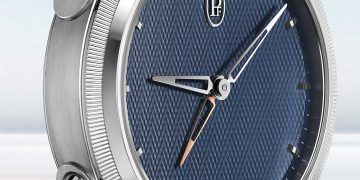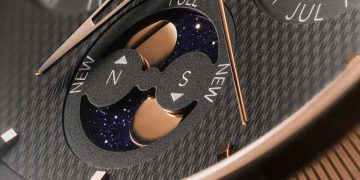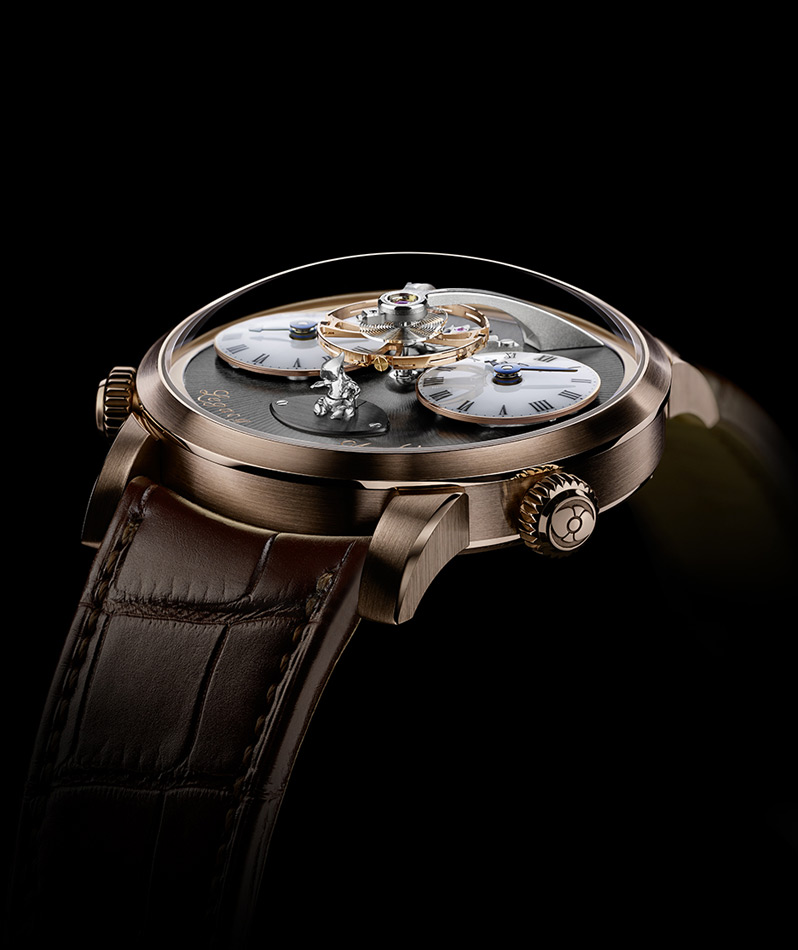 After working for nearly 45 hours without a break – all at peak performance – it’s been a long tiring day and energy levels are low. While it was relatively easy to sit up straight at the start of the day, fatigue has now set in, back languidly bends, head hits lap. ‘Mr. Up’ has become ‘Mr. Down’. But before Mr. Down shuts off completely, an invigorating influx of energy lifts his head, straightens his back and brightens his spirits. Mr. Up has been brought back to life!
After working for nearly 45 hours without a break – all at peak performance – it’s been a long tiring day and energy levels are low. While it was relatively easy to sit up straight at the start of the day, fatigue has now set in, back languidly bends, head hits lap. ‘Mr. Up’ has become ‘Mr. Down’. But before Mr. Down shuts off completely, an invigorating influx of energy lifts his head, straightens his back and brightens his spirits. Mr. Up has been brought back to life!
Welcome to the world of Legacy Machine N°1 Xia Hang. Welcome to the world of Mr. Up and Mr. Down, a collaboration between MB&F and Chinese artist Xia Hang.
Legacy Machine N°1 Xia Hang (LM1 Xia Hang) retains all of the 19th century pocket watch-inspired features of the original LM1, including the majestically suspended slowly oscillating balance wheel and dual time indications that can be set completely independently, but with a twist: the power reserve is indicated by a miniature, highly-polished aluminium man, designed by talented Chinese sculptor, Xia Hang. The man sits up straight when the movement is fully wound (Mr. Up) and gradually slumps over as the power diminishes (Mr. Down).
“I call these little men ‘comma men’, and their distinctive shape comes from a selection of art I created from 2005 to 2008. Commas do exist in Chinese writing and for me the ‘comma man’ represents a chubby boy.” Xia Hang
Xia Hang and MB&F share much in common. While MB&F create serious works of time-telling kinetic art, they don’t take themselves too seriously. Similarly, Xia Hang believes the world of art is often too serious; he likes it to be playful, and wants his sculptures to entertain and make people smile. And just like MB&F, Hang calls his kinetic sculptures ‘machines’.
“I was first introduced to Xia Hang a few years ago by a Chinese art collector friend, and visited him on the outskirts of Beijing in his workshop. I was like a child in a toy factory!” Maximilian Büsser
The in-house movement powering LM1 Xia Hang bears testimony to the enormous talent of its creators. Jean-François Mojon and his team at Chronode developed the LM1 calibre, which features the world’s first vertical power reserve and allows completely independent setting – including minutes – of both time displays. Acclaimed independent watchmaker Kari Voutilainen was responsible for the aesthetic design and for strictly ensuring the utmost respect for tradition and finish.
Legacy Machine N°1 was conceived when Maximilian Büsser started fantasising: “What would have happened if I had been born in 1867 instead of 1967? In the early 1900s the first wristwatches appear and I would want to create three-dimensional machines for the wrist, but there would have been no Grendizers, Star Wars or fighter jets for my inspiration. But I would have had pocket watches, the Eiffel Tower and Jules Verne, so what might my 1911 machine look like? It has to be round and it has to be three-dimensional: Legacy Machine N°1 was my answer.”
Legacy Machine N°1 Xia Hang is a limited edition of 12 pieces in red gold and 12 pieces in white gold. Each Machine is accompanied by a pair of stainless steel sculptures: large-scale versions of Mr. Up and Mr. Down signed by Xia Hang.
Legacy Machine N°1 Xia Hang in detail
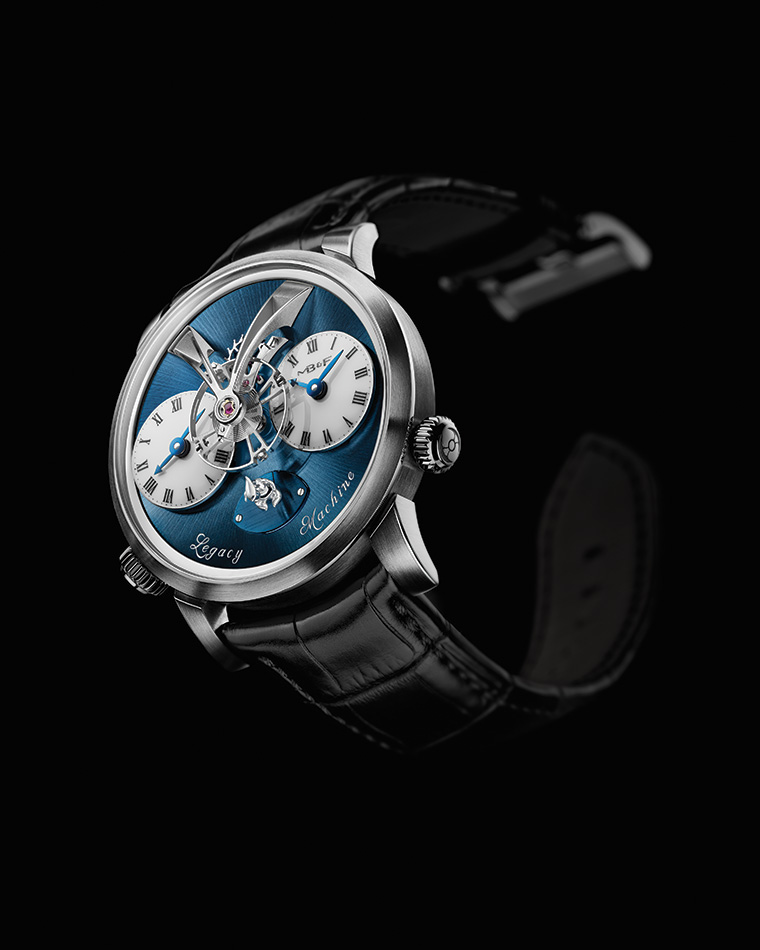
Inspiration and Realization: Maximilian Büsser has had a long affinity with pocket watches of the 18th and 19th centuries. Virtually all horological complications we see today were not only imagined in that period, they were developed using just paper and pen (no sophisticated computer programs), components were produced to extremely high precision using – by contemporary standards – fairly primitive machines (no electricity) and finely finished, assembled and regulated to an incredibly high quality that we still strive to match today. Their generous size compared with modern wristwatches allowed for uncluttered movement architectures with beautifully-shaped bridges and plates.
MB&F’s futuristic Horological Machines have always had a firm foundation in the very best of traditional horology, but Büsser wanted to pay further homage to that rich tradition by imagining the type of timepiece he might create if he had been born 100 years earlier, in 1867 instead of 1967. With its large, sedately oscillating balance, domed dials, historical bridge design and classical fine-finishing, Legacy Machine N°1 is the very contemporary, yet traditionally elegant, fruition of that dream.
Engine: LM1’s ingenious three-dimensional movement was specifically developed for MB&F from Maximilian Büsser’s sketches by Jean-François Mojon and his team at Chronode in Le Locle, Switzerland. The balance wheel and spring are at the very heart of any mechanical watch movement and are responsible for regulating timekeeping accuracy. Büsser has long been fascinated by the large, slowly oscillating – 18,000bph compared with the 28,800bph common today – balance wheels of antique pocket watches, so it was no surprise this was his starting point from which to let his imagination roam free. What was surprising though is just how radically he re-interpreted tradition by relocating the balance wheel from its more usual position hidden at the back of the movement to the top, majestically floating above the movement… even floating above the dials!
While the location of Legacy Machine N°1’s regulating organ may be considered avant-garde, ‘tradition’ is upheld by the large 14mm diameter balance wheel with regulating screws specifically developed for MB&F, balance spring with Breguet overcoil and mobile stud holder.
Another very special feature of the LM1 movement is the ability to set the two time zones completely independently. The vast majority of dual time zone movements only allow the hours to be independently adjusted, while a rare few offer setting to the half hour. Legacy Machine N°1 allows both hours and minutes of each dial to be set to whatever time the user wishes.
The vertical power reserve indicator on LM1 Xia Hang is driven by an ultra-flat differential with ceramic bearings, allowing for a slimmer complication and a more robust and longer-wearing mechanism.
‘Little man’ power reserve indicator: LM1’s power reserve complication was modified to enable Xia Hang’s comma man to seamlessly transition from slumping right over when power is low to sitting up straight at full wind. Xia Hang first created full-size sculptures, which MB&F then scaled down to a height of just 4mm (1/8″) and then developed the articulation required. The head, shoulders, back and chest of ‘Mr. Up’ (as the power reserve indicator in known when wound), all bend down – thanks to a concealed hinge – towards the horizontal as he becomes tired and Mr. Up becomes Mr. Down. The tiny micro-mechanical sculpture is crafted from aluminium to minimise energy requirements. A very high polish ensures that the little man both catches the light and the eye, as well as remaining faithful to Xia Hang’s original conception.
Dial and Indications: The rate-keeping of the twin dials is controlled by the same regulator (balance and escapement) so that once set, the two times stay perfectly synchronised with each other. Both the hours AND minutes on both dials can be set to any time desired via their respective crowns.
Complementing the three-dimensionality of the balance floating in space, the dual white dials with their bright blue gold hands float above the top of the movement. The dials are gently domed with a translucent, high-gloss lustre created using a “laque tendue” process in which multiple layers of lacquer are applied and heated, causing them to stretch over the surface of the dials.
To ensure aesthetic purity of the dials and their traditional Roman numerals, a sophisticated fixation underneath negates the necessity of visually obtrusive used screws. A fine golden perimeter circumscribing each dial elegantly reinforces their timeless classicism.
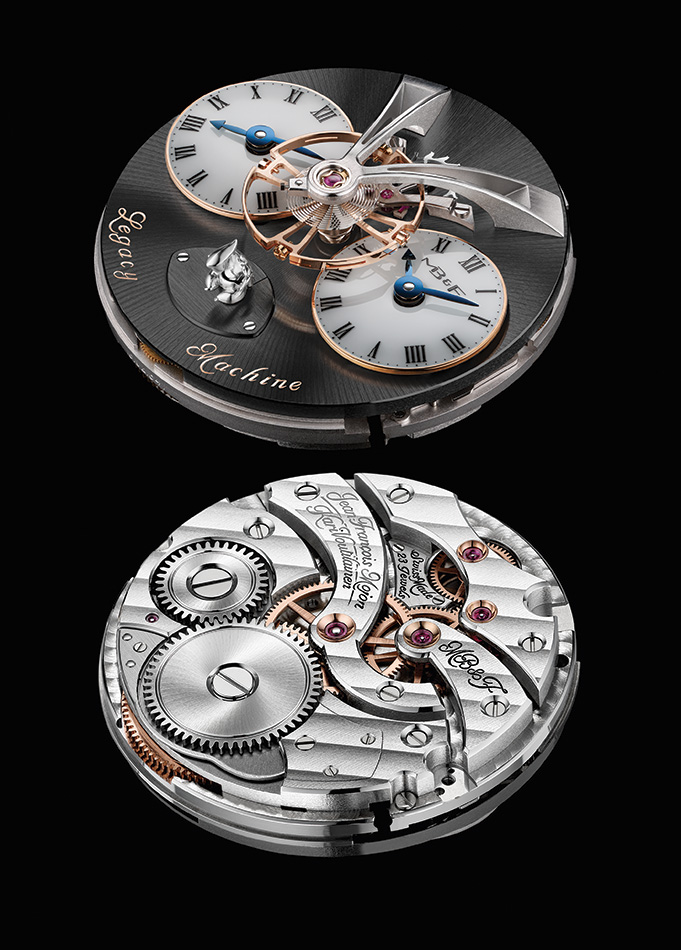
Fine Finishing and Historical Legitimacy: Acclaimed master watchmaker Kari Voutilainen assumed responsibility for ensuring the historical accuracy of the style and finishing of the Legacy Machine N°1 movement. No easy task with such an unconventional suspended-balance design from which to begin.
A finely engraved sun-ray pattern on top of the movement plate (dial side) subtly catches the eye at certain angles without distracting attention from the twin white dials, floating balance or vertical power reserve. But it is in the style and finish of the bridges and plates visible through the display on the back of the movement where Kari Voutilainen has excelled in providing exquisite historical fidelity in both the shape of elegantly curved bridges and the traditionally wide space between the bridges and between the perimeter of the bridges and the case.
On the back of the movement, over-sized ruby jewels set in highly-polished countersunk gold chatons provide striking visual counterpoints to the Geneva waves traversing the sensually curved bridges. While providing historical links with the large jewels seen in high-grade antique pocket watch movements, the ruby bearings have a practical application in reducing wear/increasing longevity by accommodating large diameter pinions and holding more lubricating oil.
Accompanying sculptures of Mr. Up and Mr. Down: In a spontaneous gesture by Xia Hang, each of the 24 pieces of LM1 Xia Hang – 12 in red gold and 12 in white gold – are accompanied by a pair of full-size (approximately 15cm/6″ high) sculptures of Mr. Up and Mr. Down in polished stainless steel and signed by the artist.
“Legacy Machine N°1 Xia Hang is the first time (and hopefully not the last) that there has been a cross-pollination between a MB&F M.A.D. Gallery artist (Xia Hang) and a MB&F watch (LM1). In curating these amazing artists at our M.A.D. Gallery in Geneva, it opens a world of possibilities in possible co-creations with MB&F’s Machines” Maximilian Büsser
Biography– Xia Hang
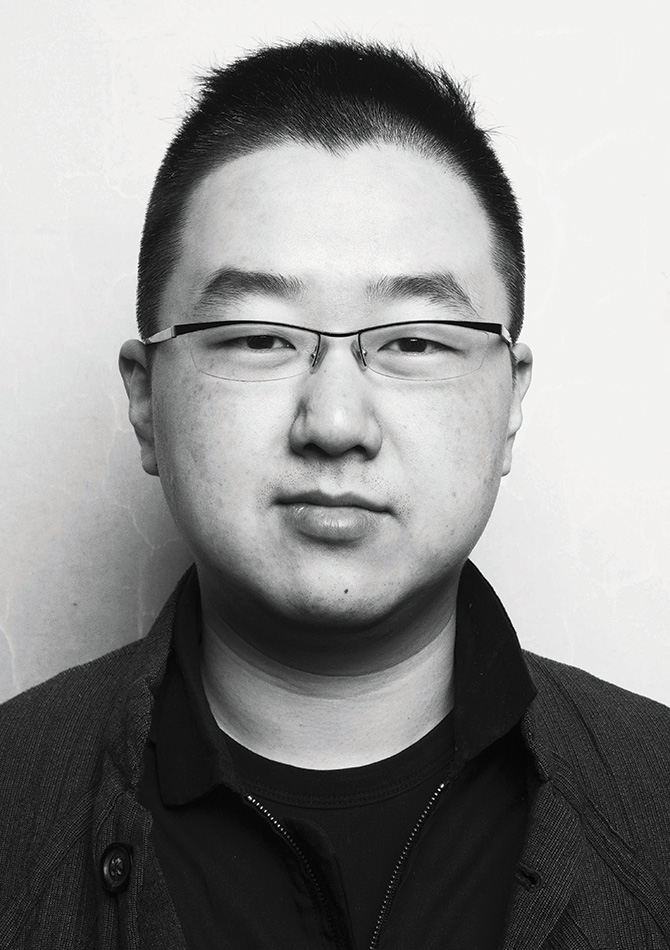
Xia Hang was born in 1978 in Shenyang, Liaoning Province, China. He started painting when he was just 10 years old and went to art college in 1997. In 2002 Xia Hang graduated with a Bachelor of Fine Arts from the Lu Xun Academy of Fine Arts in China.
His graduation work was a cluster of comma-shaped men made from mirror-polished stainless steel, the first of the highly distinctive forms that have now culminated in the power reserve indicator of Legacy Machine N°1. Xia Hang also graduated with a Masters of Fine Art from the Sculpture Department of the Central Academy of Fine Arts in China.
Since he began sculpting, Xia Hang has had an affinity for steel, drawn to it by its strength and high polish. He explains, “I have always been interested in metal. Perhaps I am drawn to the shine of metal and its durability. Metal is much stronger than stone or wood, yet it is still very malleable. I think that the changeable dynamics of metal are similar to the characteristics of humans. This is why I choose to work with metal.”
Xia Hang believes that his sculptures should be considered like toys. He wants people to touch his art, to play with it. Highlighting this philosophy, Hang’s 2008 exhibit was called “Please don’t touch”, with the “don’t” crossed out. While we may view Xia Hang’s creations as aliens, he sees them as babies. Fat babies.
“When I first met Max he was wearing a HM3 and I loved the playful sculptural nature of it. Through him, I learnt that watches could also be very creative. I admire Max’s passion in finding artists who share similar tastes and the MB&F M.A.D. Gallery in Geneva is one of my favourite art galleries in the world. I hope to be able to collect Max’s watches one day and I think that MB&F’s mechanical art work is unsurpassed. I am very pleased to have had the opportunity to collaborate with MB&F, their Machines inspire me.” Xia Hang
Legacy Machine N°1 Xia Hang – Technical Specifications
Legacy Machine N°1 Xia Hang is crafted in two limited editions of 12 pieces each: red gold with ruthenium top plate and white gold with blue top plate.
Each LM1 Xia Hang is accompanied by a pair of stainless steel sculptures of Mr. Up and Mr. Down, signed by Xia Hang
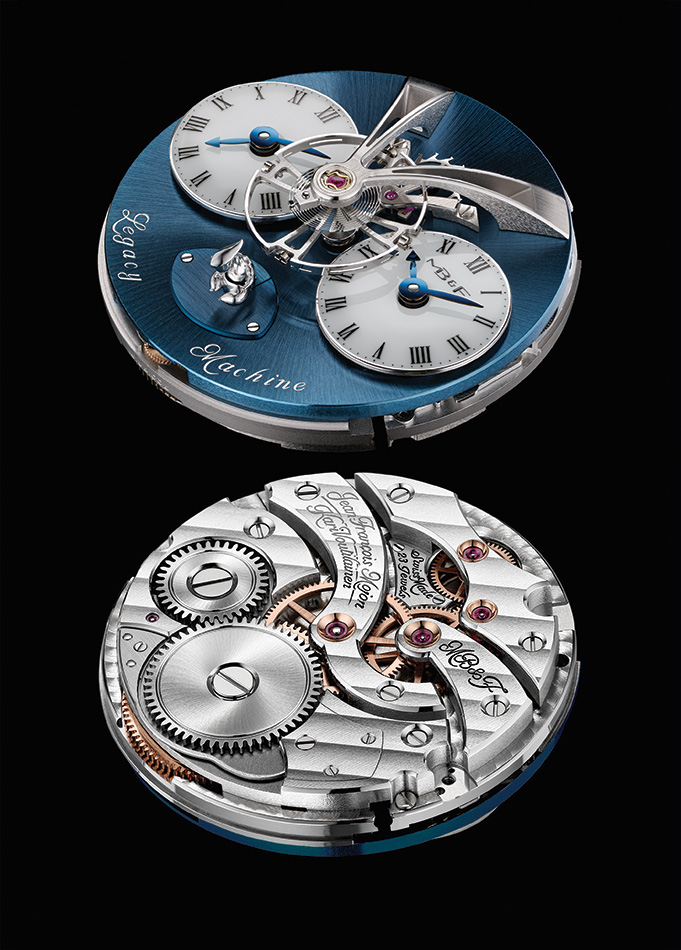
Engine:
Three-dimensional horological movement developed exclusively for MB&F by Jean-François Mojon/Chronode with aesthetic finishes specified by Kari Voutilainen
Manual winding with single mainspring barrel
Power reserve indicator: a little man designed by Chinese artist Xia Hang
Power reserve: 45 hours
Balance wheel: bespoke 14mm balance wheel with four traditional regulating screws floating above the movement and dials
Balance spring: traditional Breguet curve terminating in mobile stud holder
Balance frequency: 18,000bph/2.5Hz
Number of components: 274
Number of jewels: 23
Chatons: gold chatons with polished countersinks
Fine finishing: superlative hand finishing throughout respecting 19th century style; internal bevel angles highlighting hand craft; polished bevels; Geneva waves; hand-made engravings
Functions:
Hours and minutes; completely independent dual time zones displayed on two dials; unique vertical power reserve indicated by a highly-polished little man in aluminium
Left crown at 8 o’clock for setting time of left dial; right crown at 4 o’clock for setting time of right dial and winding
Case:
Available in 18k red gold or 18k white gold
Dimensions: 44mm wide x 16mm high
Number of components: 65
Sapphire crystals:
High domed sapphire crystal on top and sapphire crystal on back with anti-reflective coating on both sides.
Strap & Buckle:
Black or brown hand-stitched alligator strap with gold tang buckle to match case
‘Friends’ responsible for Legacy Machine N°1 Xia Hang
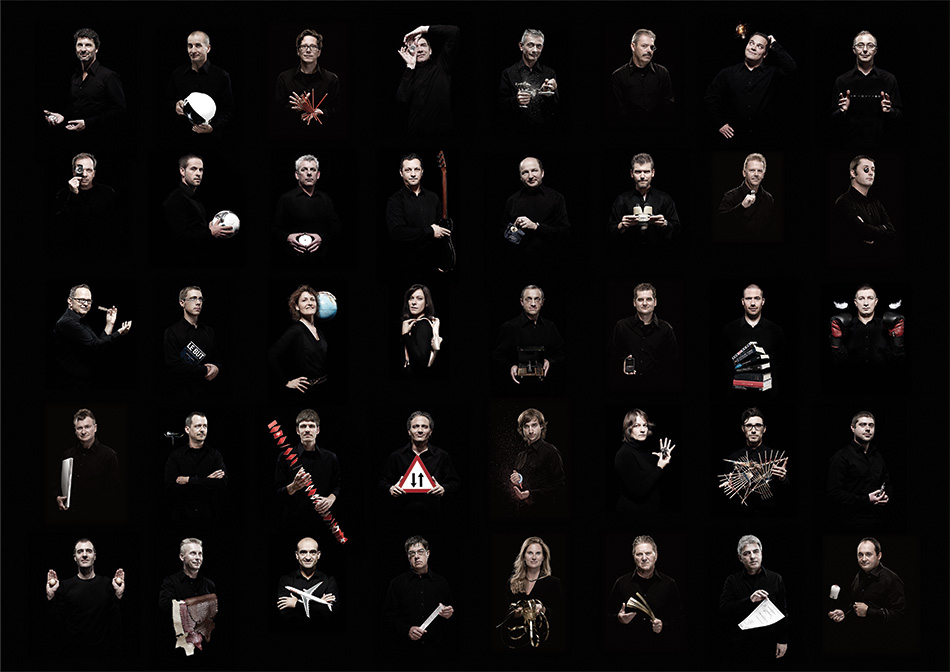
Concept: Maximilian Büsser / MB&F
Product design: Eric Giroud / Eric Giroud Design Studio
Artist for power reserve man: Xia Hang
Technical and production management: Serge Kriknoff / MB&F
Movement development: Jean-François Mojon / Chronode
Movement design and finish specifications: Kari Voutilainen
R&D: Guillaume Thévenin / MB&F
Wheels: Jean-Marc Naval / Rouages SA
Balance wheel bridge: Benjamin Signoud / AMECAP
Balance wheel: Yann Le Martret / µdec
Manufacturing of power reserve man: Sébastien Keller and Alexandre Gillet / Mutech
Plates and bridges: Rodrigue Baume / Damatec
Hand-engraving of movement: Eddy Jaquet and Sylvain Bettex / Glypto
Hand-finishing of movement components: Jacques-Adrien Rochat / C-L Rochat
Movement assemblage: Didier Dumas, Georges Veisy, Anne Guiter, Cyril Fallet and Emmanuel Maitre / MB&F
Case: Bertrand Jeunet and Dominique Mainier / G&F Chatelain
Buckle: Erbas S.A.
Dials: François Bernhard and Denis Parel / Natéber
Hands: Pierre Chillier, Isabelle Chillier and Félix Celetta / Fiedler
Glass: Martin Stettler / Stettler
Strap: Olivier Purnot / Camille Fournet
Presentation box: Olivier Berthon / ATS Développement
Production logistics: David Lamy / MB&F
Marketing & Communication: Charris Yadigaroglou and Virginie Meylan / MB&F
M.A.D.Gallery: Hervé Estienne / MB&F
Sales: Luis André and Patricia Duvillard / MB&F
Graphic design: Damien Seydoux / MB&F
Product photography: Maarten van der Ende
Portrait photography: Régis Golay / Federal
Website: Stéphane Balet, Guillaume Schmitz and Victor Rodriguez / Sumo Interactive
Texts: Ian Skellern and Steven Rogers / underthedial
MB&F – The Genesis of a Concept Laboratory
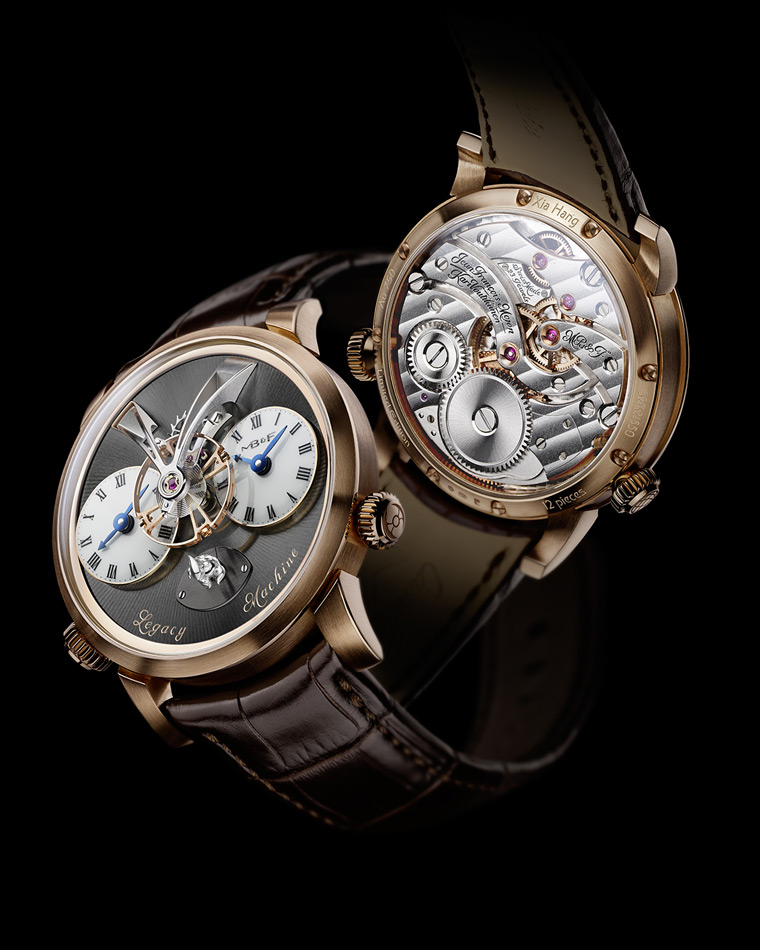
The projects that gave Maximilian Büsser the most pleasure and personal satisfaction during his 15 years managing prestigious watch brands were those working with talented independent watchmakers. An idea for his own personal utopia emerged: that of creating a company dedicated solely to designing and crafting small series of radical concept watches in collaboration with talented professionals he both respected and enjoyed working with. The entrepreneur in Büsser brought the idea to reality.
MB&F is not a watch brand, it is an artistic and micro-engineering concept laboratory in which collectives of independent horological professionals are assembled each year to design and craft radical Horological Machines. Respecting tradition without being shackled by it enables MB&F to act as a catalyst in fusing traditional, high-quality watchmaking with cutting-edge technology and avant-garde three-dimensional sculpture.
In 2007, MB&F unveiled their first Horological Machine, its sculptured, three-dimensional case and beautifully finished Engine setting the standard for the idiosyncratic Machines that followed – Machines that tell the time, rather than Machines to tell the time. In 2011, MB&F launched their round-cased Legacy Machine collection. These more classical pieces (classical for MB&F that is) pay tribute to 19th century watchmaking excellence by reinterpreting complications from the great horological innovators to create contemporary objets d’art. Each year, MB&F alternate between launching an exciting new Horological Machine and an historically-inspired Legacy Machine.
Biography – Maximilian Büsser
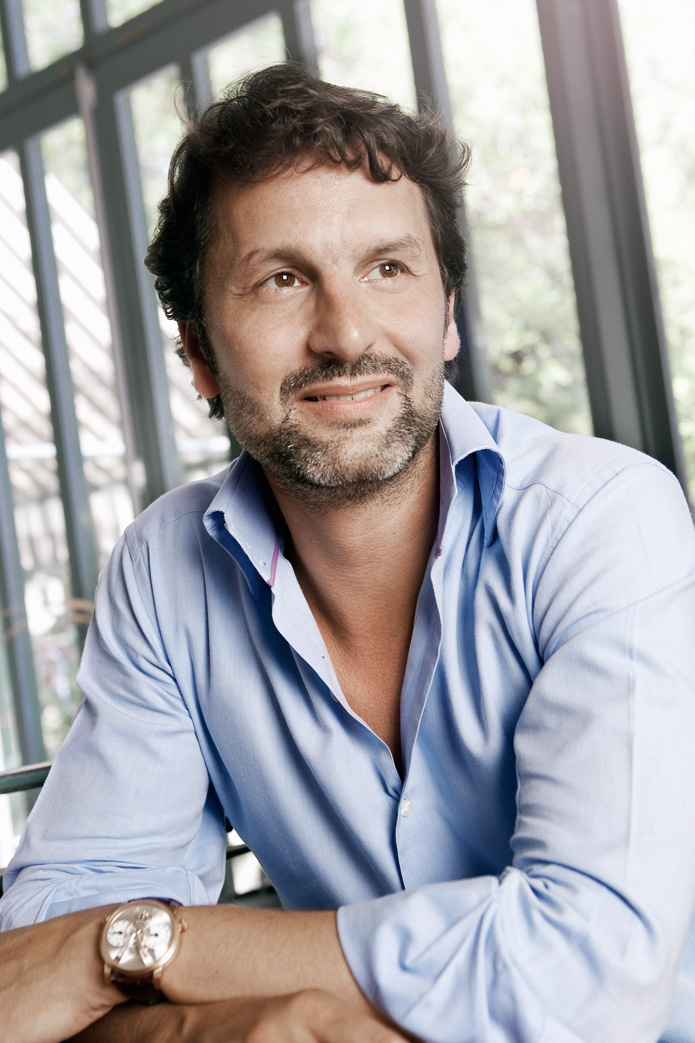
Maximilian Büsser was born in Milan, Italy, before moving at an early age to Lausanne, Switzerland where he spent his youth. Growing up in a multi-cultural environment and family – his father was a Swiss diplomat who met his mother, an Indian national, in Mumbai – led Büsser to develop a cross-cultural, broad-based approach to life and to business.
In July 2005, at the age of 38, Büsser created the world’s first horological concept brand: MB&F (Maximilian Büsser & Friends), in which he is now partnered with Serge Kriknoff. Büsser’s dream with MB&F is to have his own brand dedicated to developing radical horological concepts by working in small, hyper-creative groups composed of people he enjoys working with.
Entrepreneurship is Maximilian Büsser’s forte. In 1998, when only 31, he was appointed Managing Director of Harry Winston Rare Timepieces in Geneva. During his seven years there Büsser developed the company into a fully-fledged and well-respected haute horlogerie brand by developing the strategy, products, marketing and worldwide distribution, whilst integrating design, R&D and manufacturing in house. The results were a 900% increase in turnover and the positioning of Harry Winston as one of the leaders in this very competitive segment.
Maximilian Büsser’s love for high-end horology was nurtured by his first employer, Jaeger-LeCoultre. During his seven years in the senior management team during the 1990s, JLC strongly increased its profile and multiplied its turnover tenfold. Büsser’s responsibilities at Jaeger-LeCoultre ranged from Product Management & Development to Sales & Marketing for Europe.
Büsser graduated in 1991 with a Masters in Microtechnology Engineering from the Swiss Federal Institute of Technology, Lausanne.

